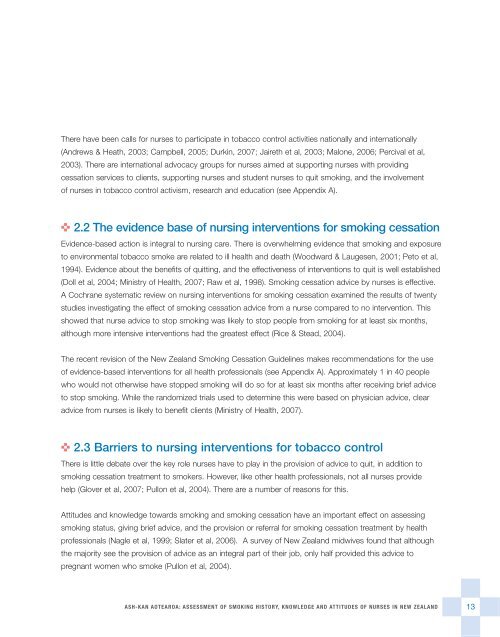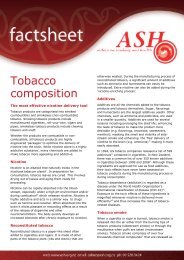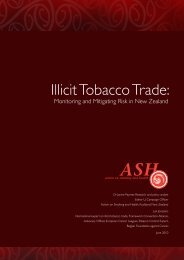2. <strong>Nurses</strong> <strong>and</strong> smok<strong>in</strong>g✜ 2.1 Nurs<strong>in</strong>g <strong>and</strong> tobacco controlTobacco control means implement<strong>in</strong>g a range of supply, dem<strong>and</strong> <strong>and</strong> harm reduction strategies that aimto improve the health of a population by prevent<strong>in</strong>g smok<strong>in</strong>g uptake, promot<strong>in</strong>g quitt<strong>in</strong>g <strong>and</strong> protect<strong>in</strong>gnonsmokers from exposure to secondh<strong>and</strong> tobacco smoke (World Health Organisation, 2003).<strong>Nurses</strong> form the largest health professional group <strong>in</strong> New Zeal<strong>and</strong>. In March 2006 there were 44,442 nurseswith current practis<strong>in</strong>g certificates, one for every fourteen regular smokers (Clark & Ayl<strong>in</strong>g, 2006; StatisticsNew Zeal<strong>and</strong>, 2007b). <strong>Nurses</strong> with practis<strong>in</strong>g certificates <strong>in</strong>clude expert nurse practitioners (0.05%), registerednurses (90%), <strong>and</strong> nurse assistants <strong>and</strong> enrolled nurses (9%) (Clark & Ayl<strong>in</strong>g, 2006). Registered nurses workwith<strong>in</strong> a competency framework that acknowledges the different health <strong>and</strong> socio-economic status of Maori<strong>and</strong> non-Maori, cultural safety, promotion of healthy environments <strong>and</strong> health education (The Nurs<strong>in</strong>g Councilof New Zeal<strong>and</strong>, 2005). These are all elements of tobacco control. The role of nurses <strong>and</strong> their holistic focusenable them to <strong>in</strong>clude smok<strong>in</strong>g cessation <strong>and</strong> promotion of smokefree environments <strong>in</strong> nurs<strong>in</strong>g care at alllevels of the cont<strong>in</strong>uum of health <strong>and</strong> illness (Jones & McLachlan, 2006). Enrolled nurses <strong>and</strong> nurse assistantsassist registered nurses <strong>and</strong> work with<strong>in</strong> their own scope of practice <strong>and</strong> levels of competence (The Nurs<strong>in</strong>gCouncil of New Zeal<strong>and</strong>, 2004). These are compatible with the professional development opportunities offeredby smok<strong>in</strong>g cessation tra<strong>in</strong><strong>in</strong>g <strong>and</strong> practice.There are many nurses <strong>in</strong> the dedicated smokefree workforce <strong>in</strong> New Zeal<strong>and</strong>. Examples <strong>in</strong>clude nurseslead<strong>in</strong>g coord<strong>in</strong>ation of smokefree policy implementation <strong>in</strong> District Health Boards <strong>and</strong> nurses who work forsmok<strong>in</strong>g cessation providers. Other nurses <strong>in</strong>tegrate smok<strong>in</strong>g cessation <strong>in</strong>to their everyday nurs<strong>in</strong>g workor have a special <strong>in</strong>terest <strong>in</strong> tobacco control (Emmanuel, 2007; McLeod et al, 2005; Town et al, 2000).<strong>Nurses</strong> are well placed to promote smokefree lifestyles to youth, help clients quit <strong>and</strong> promote smokefreeenvironments (Andrews & Heath, 2003). They work <strong>in</strong> primary care sett<strong>in</strong>gs where healthy people live <strong>and</strong>work (for example schools, prisons <strong>and</strong> workplaces) as well as with people seek<strong>in</strong>g help for health relatedissues. They work with people of all ages. They visit people <strong>in</strong> their homes <strong>and</strong> also see them at times whenclients are receptive to advice to quit such as when they are hospitalized for cardiovascular disease (Rice &Stead, 2004). <strong>Nurses</strong> have opportunities to engage with family members who smoke <strong>and</strong> offer support tothem for quitt<strong>in</strong>g to improve their health as well as to protect the health of their families (Jones & McLachlan,2006). They often <strong>in</strong>teract with clients for some time, offer<strong>in</strong>g opportunities to provide follow-up support.<strong>Nurses</strong> support <strong>in</strong>terdiscipl<strong>in</strong>ary teamwork by provid<strong>in</strong>g clients’ with smok<strong>in</strong>g cessation advice <strong>and</strong> treatment.In a recent survey, 65% of New Zeal<strong>and</strong> general practitioners (GPs) reported that their second choice ofreferral for cessation support for clients was to practice nurses (Glover et al, 2007).12<strong>ASH</strong>-KAN AOTEAROA: ASSESSMENT OF SMOKING HISTORY, KNOWLEDGE AND ATTITUDES OF NURSES IN <strong>NEW</strong> <strong>ZEALAND</strong>
There have been calls for nurses to participate <strong>in</strong> tobacco control activities nationally <strong>and</strong> <strong>in</strong>ternationally(Andrews & Heath, 2003; Campbell, 2005; Durk<strong>in</strong>, 2007; Jaireth et al, 2003; Malone, 2006; Percival et al,2003). There are <strong>in</strong>ternational advocacy groups for nurses aimed at support<strong>in</strong>g nurses with provid<strong>in</strong>gcessation services to clients, support<strong>in</strong>g nurses <strong>and</strong> student nurses to quit smok<strong>in</strong>g, <strong>and</strong> the <strong>in</strong>volvementof nurses <strong>in</strong> tobacco control activism, research <strong>and</strong> education (see Appendix A).✜ 2.2 The evidence base of nurs<strong>in</strong>g <strong>in</strong>terventions for smok<strong>in</strong>g cessationEvidence-based action is <strong>in</strong>tegral to nurs<strong>in</strong>g care. There is overwhelm<strong>in</strong>g evidence that smok<strong>in</strong>g <strong>and</strong> exposureto environmental tobacco smoke are related to ill health <strong>and</strong> death (Woodward & Laugesen, 2001; Peto et al,1994). Evidence about the benefits of quitt<strong>in</strong>g, <strong>and</strong> the effectiveness of <strong>in</strong>terventions to quit is well established(Doll et al, 2004; M<strong>in</strong>istry of Health, 2007; Raw et al, 1998). <strong>Smok<strong>in</strong>g</strong> cessation advice by nurses is effective.A Cochrane systematic review on nurs<strong>in</strong>g <strong>in</strong>terventions for smok<strong>in</strong>g cessation exam<strong>in</strong>ed the results of twentystudies <strong>in</strong>vestigat<strong>in</strong>g the effect of smok<strong>in</strong>g cessation advice from a nurse compared to no <strong>in</strong>tervention. Thisshowed that nurse advice to stop smok<strong>in</strong>g was likely to stop people from smok<strong>in</strong>g for at least six months,although more <strong>in</strong>tensive <strong>in</strong>terventions had the greatest effect (Rice & Stead, 2004).The recent revision of the New Zeal<strong>and</strong> <strong>Smok<strong>in</strong>g</strong> Cessation Guidel<strong>in</strong>es makes recommendations for the useof evidence-based <strong>in</strong>terventions for all health professionals (see Appendix A). Approximately 1 <strong>in</strong> 40 peoplewho would not otherwise have stopped smok<strong>in</strong>g will do so for at least six months after receiv<strong>in</strong>g brief adviceto stop smok<strong>in</strong>g. While the r<strong>and</strong>omized trials used to determ<strong>in</strong>e this were based on physician advice, clearadvice from nurses is likely to benefit clients (M<strong>in</strong>istry of Health, 2007).✜ 2.3 Barriers to nurs<strong>in</strong>g <strong>in</strong>terventions for tobacco controlThere is little debate over the key role nurses have to play <strong>in</strong> the provision of advice to quit, <strong>in</strong> addition tosmok<strong>in</strong>g cessation treatment to smokers. However, like other health professionals, not all nurses providehelp (Glover et al, 2007; Pullon et al, 2004). There are a number of reasons for this.Attitudes <strong>and</strong> knowledge towards smok<strong>in</strong>g <strong>and</strong> smok<strong>in</strong>g cessation have an important effect on assess<strong>in</strong>gsmok<strong>in</strong>g status, giv<strong>in</strong>g brief advice, <strong>and</strong> the provision or referral for smok<strong>in</strong>g cessation treatment by healthprofessionals (Nagle et al, 1999; Slater et al, 2006). A survey of New Zeal<strong>and</strong> midwives found that althoughthe majority see the provision of advice as an <strong>in</strong>tegral part of their job, only half provided this advice topregnant women who smoke (Pullon et al, 2004).<strong>ASH</strong>-KAN AOTEAROA: ASSESSMENT OF SMOKING HISTORY, KNOWLEDGE AND ATTITUDES OF NURSES IN <strong>NEW</strong> <strong>ZEALAND</strong> 13





